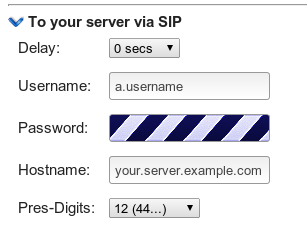VoIP SIP Trunks: Difference between revisions
No edit summary |
mNo edit summary |
||
| Line 44: | Line 44: | ||
It is also possible to register your PBX against the 'Base' Number, then calls for numbers in the 'Group' will be sent to that registration. |
It is also possible to register your PBX against the 'Base' Number, then calls for numbers in the 'Group' will be sent to that registration. |
||
===NAT?=== |
|||
Please note that the base number CLI logic can be broken by NAT. We initially look for a registration for the number we have on a call (e.g. DDI), and if found, we use it. If not, and if base number is set, we check if the base number has a registration. If so, we use the DDI followed by the contact from the registration. When NAT is used we can't trust the contact for the registration. |
Please note that the base number CLI logic can be broken by NAT. We initially look for a registration for the number we have on a call (e.g. DDI), and if found, we use it. If not, and if base number is set, we check if the base number has a registration. If so, we use the DDI followed by the contact from the registration. When NAT is used we can't trust the contact for the registration. |
||
Revision as of 13:01, 16 May 2016
A SIP Trunk is a service where by VoIP calls are routed to and from SIP servers. A customer may have their own SIP Server/PBX, and need a 'SIP Trunk' service in order to make and receive calls though AAISP.
Our VoIP system can simple 'trunk' calls to/from your own PBX - it is perfectly normal for you to have your own office PBX, such as a FireBrick or an Asterisk server for example and for your equipment to provide you will all the 'PBX' type functionally that you require. However, you can also have SIP phones register directly against our servers and use the PBX functionality that we provide. Or, indeed, have a mix of the 2 - e.g. we can route calls to you by SIP (trunk), but we can also record calls.
Outbound SIP Trunks
SIP trunks are available from AAISP. In practice all VoIP accounts from AAISP can be used as a SIP Trunk, in that the SIP account can be used to make multiple outbound calls.
There is no limit on the number of outbound calls you can make with an AAISP VoIP account, simply use the username/password and the server in your PBX config.
If you'd like SIP trunks from AAISP, then please do contact the Sales department.
CLI/Presentation Number
For outbound calls, we will allow you to present the CLI of any number which has a base number that points to the number you're using as authentication.
We are also able to set up an additional number on request, see VoIP Presentation Number.
Inbound SIP Trunks
Inbound calls can be routed to a registered SIP phone, redirected to another number or routed to your own SIP server. To help where a customer may have a block of numbers the AAISP Control Pages have a concept of grouping numbers together to use a common number as their settings.
Base/Group Numbers
AAISP are able to provide multiple phone numbers, and blocks of numbers, e.g. blocks of 10, 20, 100, 1000 etc.
On the Control Pages blocks of numbers can be configured in such a way that there is a 'Base' Number, and all other numbers have the Base set in the Group settings. With this setup the individual number mirror the settings on the Master.
This means that settings can be changed on the Base Number which affect all numbers in the Group.

When a number has a Base set, then many of the settings for that number are hidden - as it will inherit its settings from the Base number.
Then on the Base number, you can set Incoming calls to be set to your server

For example, say you have a block of 10 numbers:
- Set all the 'SIP to Server' settings on the number ending 0
- On the 9 other numbers set the Base/group setting to be the number ending 0
This then makes all the number inherit the settings from the 0 number, i.e., calls for any of the numbers will be sent to the SIP server settings as specified in the Base Number.
It is also possible to register your PBX against the 'Base' Number, then calls for numbers in the 'Group' will be sent to that registration.
NAT?
Please note that the base number CLI logic can be broken by NAT. We initially look for a registration for the number we have on a call (e.g. DDI), and if found, we use it. If not, and if base number is set, we check if the base number has a registration. If so, we use the DDI followed by the contact from the registration. When NAT is used we can't trust the contact for the registration.
Asterisk
If you are using the asterisk PBX, or systems based on asterisk, please see VoIP Phones - Asterisk for notes on configuration.
Other VoIP Features
<ncl style=bullet maxdepth=5 headings=bullet headstart=2 showcats=1 showarts=1>Category:VoIP Features</ncl>